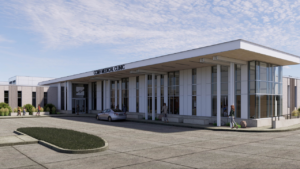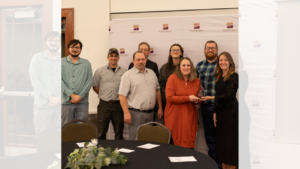“A paid internship program has been the topic of conversation with leadership as well as frontline staff for a long time.”
That’s Dana Neemann, Director of Education at CCMH.
“Macy Webb, our Director of Human Resources, and I sat down and figured out to make this happen. We created a program structure to entice young men and women to spend their summer in a paid internship in small town Iowa.”
Neeman says the internship program at CCMH is more than just job shadowing.
“We were able to incorporate a variety of experiences for our interns. These included regular professional development sessions we we paired with on-the-job clinical learning. These are college students who are already pursuing a course of study and committed to a career in health care. We felt it would be most helpful to them to show the interns exactly what working in healthcare is all about.”
Through Neemann’s work as Director of Education, CCMH has the opportunity to interact with students during their junior high and high school years.
“It starts with our Scrubs Camp which we conduct two or three times per year. It’s open to both junior high and high school students. Once in high school, we also offer students observation experiences. Because of our previous relationships with students, it helps us to identify who might be interested in participating in an internship program.”
The goal of the internship program was providing more hands-on experiences and the opportunity to work side-by-side with front line staff.
“We were fortunate enough to employ six (6) paid interns in the program for an eight-week rotation. We had four nursing interns. Two of the interns were housed in the Emergency department during their rotation. In addition, two interns on the medical surgical unit. We also had one intern in the Rehab Services department and one intern housed in the Radiology department. Each of the students is at a different point in their education for their careers.”
Professional development was one of the highlights of the program.
“Once a week, we conducted a professional development class that focused on soft skills. These are also called interpersonal skills. Being able to develop and sustain relationships both inside and outside of the work environment is important. As human beings, we all struggle learning soft skills. This includes how to handle difficult conversations and how to handle your own personal emotional responses. Through our conversations with the interns, we were able to help them map out and utilize the tools and the resources for the soft skills they’ll need in their future endeavors. It was very interactive.”
Other real-life skills taught included customer service and safe patient handling.
“Our goal is making sure we’re being safe for ourselves and for our patients. Infection control was another skill we worked on. We conducted a telemetry class. It gave all the interns the basics of being able to understand how to read telemetry and when to really anticipate problems with the patient. Finally, all of our interns experienced on-the-job phlebotomy training. Each passed the course and received an internal certificate that allowed them to perform phlebotomy within our organization.”
From a human resources standpoint, it is difficult to recruit professionals to work in hospitals and clinics in rural Iowa. Neemann sees the internship program assisting CCMH with that issue.
“First of all, the internship program gives us the opportunity to develop relationships with those young men and women who are going to be our future peers. We had the chance to generate excitement and create a personal and professional relationship with them. The interns now have insight into the workings of a health care organization in rural Iowa. We will maintain contact with them. We have a vested interest in their futures. We hope they would consider coming back to CCMH as they begin a healthcare career.”
Information technology (IT) in healthcare is one area Neemann would like to emphasize in future internship programs.
“IT has become a huge part of health care. Like other industries, some aspects of healthcare are heavily automated. If you have a piece of equipment that doesn’t work, you’re usually calling the IT department, not the maintenance department, to figure out how to fix it.”
Future interns will benefit from the suggestions of those who graduated from this year’s program.
“We received very honest feedback. Every single one of the interns were complimentary. They’ve also suggested additional experiences in the future for special cases and surgery. A common theme from the responses indicated to us the internship experience was very eye-opening for the students. They were able to experience different aspects of the health care system. Especially, how a critical access hospital is operated and how a rural health clinic is run. People don’t realize how robust we really are in these areas.”
Neemann says enrollment in the next Internship Program will open up in March 2025. Those interested in learning more about the program, can contact her directly at 712-265-2795. Or email at dneemann@ccmhia.com.


